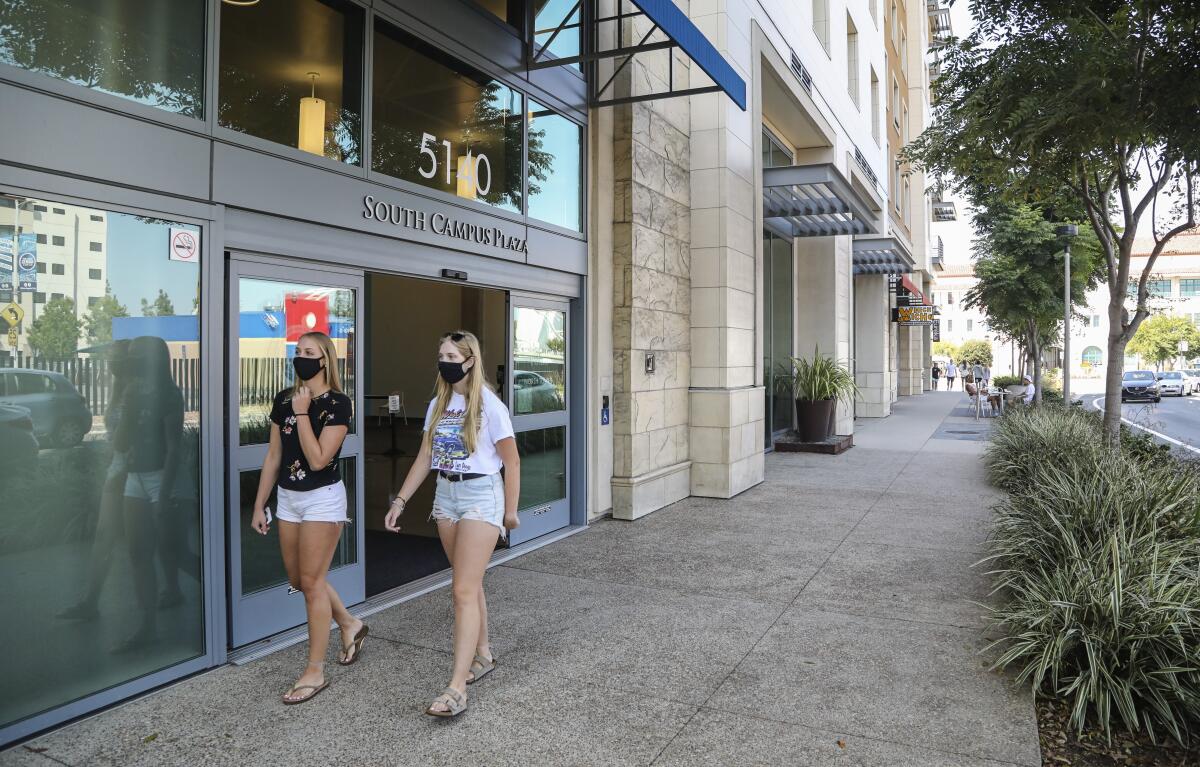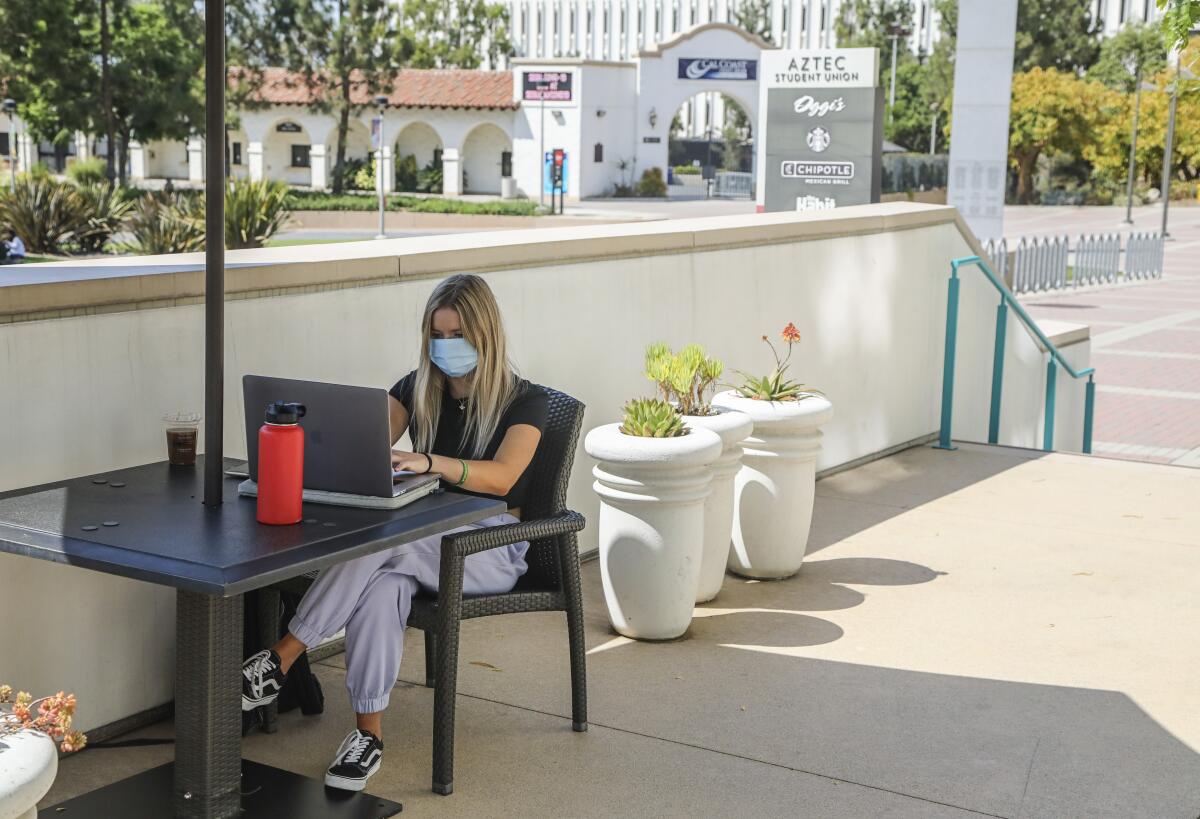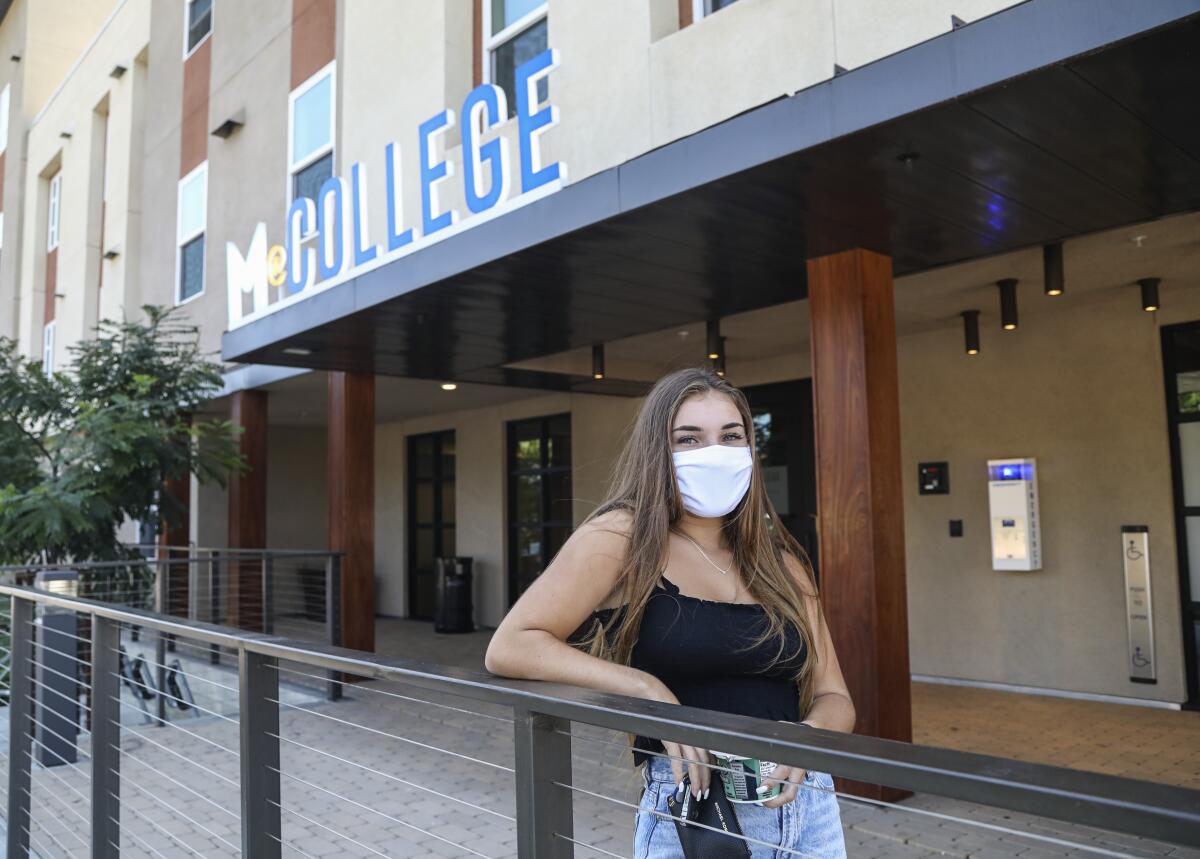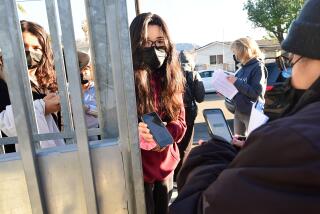San Diego State hits pause button as COVID-19 cases grow

- Share via
With the novel coronavirus surging among the San Diego State student body, the university announced on Wednesday a “pause” in in-person classes. Public health officials said 64 people at SDSU had confirmed cases of COVID-19 and about 100 more, mostly living off campus, were now under quarantine.
The news, which came just nine days after the start of SDSU’s fall semester on Aug. 24, was a significant setback for a university that brought 7,997 of its 35,485 enrolled students back to campus to participate in roughly 200 different courses — mostly labs — deemed difficult to teach through distance-learning platforms.
Luke Wood, the university’s vice president of student affairs and chief diversity officer, said all in-person courses, made up of 627 total classes, would be taught online for the next four weeks, during which the university will assess the spread of the virus among students, faculty and staff.
The pause was not confined to classes. The university also announced a two-week pause for on-campus practices and workouts for student athletes.
Given that attending at least one in-person class was the main reason the students came to campus, Wood acknowledged Wednesday afternoon that some, including the 2,600 now living in campus housing, might see no further reason to stay.
But heading home, he added, will come with its own requirements for anyone who wishes to return.
“If any student chooses to leave their on-campus house, they will be permitted to do so,” Wood said. “However, if they return at a later time, they will be required to quarantine for a 14-day period.”
It is a somewhat more nuanced approach than has been seen recently at universities struggling to navigate in-person education in the midst of a pandemic. Chico State, for example, halted all in-person classes this week after 36 students and staffers tested positive and cleared its dorms, sending students home.
It was not clear whether such a step might be necessary at SDSU. Dr. Eric McDonald, medical director of the county’s epidemiology unit, said his office had worked daily with university case investigators to quickly confirm infections through testing, identify those in close contact with those who had tested positive, and order quarantines for those exposed.
But it was clear over the weekend that many recently returned students mingled, often without wearing masks or maintaining six feet of distance, in the neighborhoods surrounding campus. It is a bit too early to tell, McDonald said, whether the virus is spreading at something like an exponential rate or whether containment efforts undertaken so far have managed to break chains of person-to-person transmission.
Although the physician says there are not yet enough cases to say how quickly the case rate will rise, it is certain that more infections will be detected.
“We expect the numbers to go up; this is a serious situation,” McDonald said. “I have no doubt, frankly, that this will go into triple digits.”
And concerns go far beyond SDSU.
All cases among students are added to the county’s overall coronavirus totals, which determine where San Diego County sits in the state’s new four-tier reopening blueprint. If the number of daily cases per 100,000 residents climbs beyond seven, or the percentage of positive coronavirus tests exceeds 8%, San Diego would fall to the lowest tier, and local businesses, churches and other organizations would lose the ability to conduct some indoor operations that they only just regained.
Three additional outbreaks, 250 cases and seven deaths were included in the county’s daily COVID-19 tracking report Wednesday. Outbreaks occurred at two restaurants with bars and one residence that a county official who declined to be named said was actually an SDSU dorm.
The university did not respond Wednesday afternoon to requests for confirmation of the outbreak, though an official did say Monday that cases have occurred at the Zapotec, Villa Alvarado Apartments and South Campus Plaza North, all part of SDSU’s housing system.
On campus

Wednesday afternoon, Kaitlyn Infanger, a freshman living at South Campus Plaza North, said she was taking the current situation day by day.
“It’s definitely scary,” she said, “but as long as my roommate and I are careful, I think it’s going to be OK.”
The 18-year-old from Los Angeles said coronavirus restrictions had made it difficult to meet other students and get the full college experience. She said she might go home if cases continued to increase because all her classes were online.
It was clear that total separation was hard to pull off among young people out on their own, often for the first time.
A group of students sitting outside South Campus Plaza wore face masks but occasionally pulled them down to their chins to talk or take sips of their coffee.
Jaden, 18, who provided only his last name, walked out of a dorm on College Avenue and said most people were trying to do their best to stay safe.
He said he was worried that cases were going up, especially because he knows there are reports of positive tests coming back among the residents of his building. He walked out of his dorm wearing two face masks for extra protection.
“It’s a little scary,” he said. “I’m thinking of going back home because it’s kind of picking up a bit.”
Most students on campus Wednesday afternoon wore face masks and tried to practice social distancing. Some students studied and watched online lectures inside the Lee and Frank Goldberg Courtyard in the student union. Tables were positioned at least six feet apart ,and most tables only had one chair to keep students from sitting in groups.

Danielle Washington, 19, lives at the M@College apartments, where one positive COVID-19 case was reported earlier this week. She said she wasn’t concerned about getting sick because people who tested positive must quarantine in their own apartment units.
“I’m not too worried about it,” Washington said.
It was clear last weekend that many shared that opinion.
The San Diego Union-Tribune observed about 200 students, mostly in groups, walking without masks on campus and in adjacent neighborhoods between 11:30 p.m. Friday and 2 a.m. Saturday.
In response, the university hired Elite Security, a private security firm, to patrol neighborhoods, collect information on health order violations, and report the information to the university for further action.
Wood said Wednesday that his office had followed up.
“We have been issuing warnings, notices and investigations to organizations and individuals,” Wood said, though he did not provide hard numbers to back up his statements.
Sisson and Lopez-Villafaña write for the San Diego Union-Tribune.
More to Read
Sign up for Essential California
The most important California stories and recommendations in your inbox every morning.
You may occasionally receive promotional content from the Los Angeles Times.













